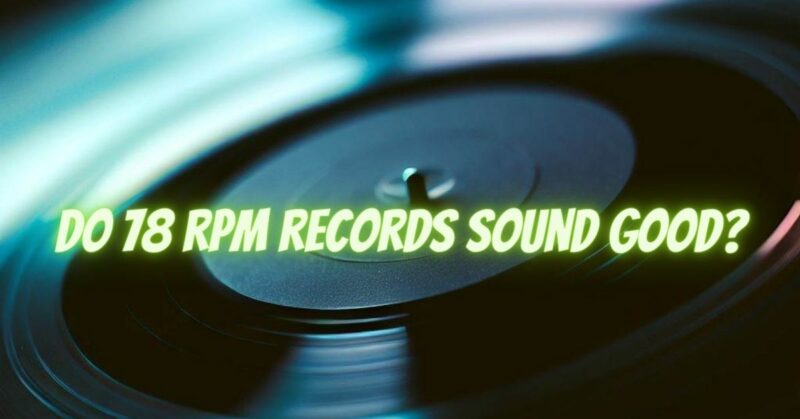In the world of vinyl records, one format stands as a relic of the past, capturing a bygone era of music: the 78 RPM record. With its distinctive speed and charm, the 78 RPM format offers a glimpse into the early days of recorded music. In this article, we will delve into the sonic qualities of 78 RPM records, exploring their unique sound and discussing the factors that contribute to their enduring appeal.
- The Era of Shellac Records:
78 RPM records were predominantly made from a brittle material called shellac, which offered durability but limited playback time. This format flourished from the late 19th century through the mid-20th century, capturing performances from legendary artists of the time.
- Characteristic Sound Aesthetics:
The sound produced by 78 RPM records has a distinct character and aesthetic. Due to the limitations of early recording and manufacturing techniques, 78 RPM records possess a warm, vintage sound with a notable emphasis on midrange frequencies. This tonal quality can lend a certain nostalgic charm to the music, evoking the era in which these records were popular.
- Higher Noise Floor and Surface Noise:
78 RPM records often exhibit a higher level of surface noise compared to later vinyl formats. The inherent crackles, pops, and surface imperfections contribute to the unique sonic texture of the recordings. While some listeners find these imperfections endearing, others may perceive them as drawbacks. However, advancements in modern playback equipment and restoration techniques have made it possible to minimize surface noise and enhance the overall listening experience.
- Capturing Live Performances and Historical Significance:
Many early recordings on 78 RPM records captured live performances by artists who were at the forefront of their respective genres. These records offer a glimpse into the musical styles and techniques of the past, preserving historically significant moments in music history. For collectors and enthusiasts, the value lies not only in the sonic qualities but also in the historical and cultural significance of these recordings.
- Dedicated Community and Audiophile Interest:
Despite the advent of newer formats, a dedicated community of collectors and enthusiasts continues to appreciate and actively seek out 78 RPM records. Audiophiles and music aficionados are drawn to the unique sonic characteristics and historical value these records possess. Some even argue that the limitations and imperfections of 78 RPM records add a certain authenticity and depth to the music that cannot be replicated by modern formats.
Conclusion:
While the sonic qualities of 78 RPM records may differ from those of contemporary vinyl formats, their unique sound and historical significance have ensured their enduring appeal. These records provide a captivating glimpse into the past, with their warm tonality and distinctive surface noise adding a vintage charm to the music. For collectors, audiophiles, and music enthusiasts, exploring the world of 78 RPM records offers a nostalgic and enriching experience, allowing them to connect with the origins of recorded music. So, embrace the crackles, pops, and vintage allure, and embark on a sonic journey through the captivating realm of 78 RPM records.


